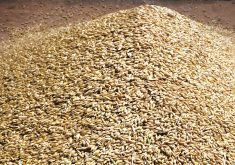CNS Canada — As supplies tighten, Lethbridge feedlots are looking for the cheapest options when it comes to feed.
“Supply seems to be tight in general. There’s not a lot of offers on either corn or barley at the moment. And demand is higher than expected coming into March,” said Brandon Motz, sales manager at CorNine Commodities in Lacombe, Alta.
Manitoba corn has been making its way to feedlots lately, but according to Motz logistics are coming into play making corn from south of the border more attractive.
Read Also

Dryness poised to threaten Saskatchewan crops
Crops in Saskatchewan are developing in opposite directions, the province’s latest crop report said. Growing conditions in the province vary, with some areas receiving enough rain while other locations are experiencing crop stress due to hot, dry conditions.
“A large of chunk of (corn) is coming from (the U.S.) simply because we can move in 100 cars at a time. It’s just logistically a little easier to manage,” he said.
Supply has been consistent from Manitoba, but at smaller volumes than from the U.S.; corn from the U.S. is also cheaper, due to large U.S. stocks.
However, corn prices across the board are on the upswing due to increased demand and tightened supplies.
In the last two weeks, Manitoba corn has rallied 20 cents, according to Motz. Manitoba corn bids are sitting between $4.40 and $4.50 a bushel picked up from the farm as of Wednesday.
U.S. corn also has seen an increase lately and is sitting in the $2.32-$2.35 per bushel range for delivery to feedlot, according to Motz.
“I would think anybody that’s gotten on the corn program is looking to reload with corn before the April, May, June cycle. If barley became fairly attractive versus corn, you could convince them to switch, but coming in through March the timeline’s getting fairly tight,” he said.
The Alberta barley market is heating up, though, according to Motz. As feed supplies tighten, interest is increasing for feed barley.
At CornNine, feed barley for pickup in central Alberta was sitting Wednesday at $4.40-$4.60 per bushel.
Feed oats, however, aren’t seeing a lot of interest. According to Motz, there isn’t a strong supply of feed oats, which makes them less attractive to feedlots.
“There’s always interest but once again a strong supply is always a factor,” he said. “I would say next to corn and barley, wheat is probably the next favourable commodity but once again, price point becomes an issue.”
Feed oats on Wednesday at CorNine were at $2.80-$3 for farm pickup; however, Motz said that isn’t a firm number, just an indication.
Feed wheat was sitting in the $5.50-$5.60 per bushel range for pickup in central Alberta.
— Ashley Robinson writes for Commodity News Service Canada, a Glacier FarmMedia company specializing in grain and commodity market reporting.




















